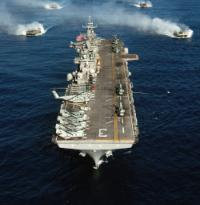Last August, the senior officer aboard the USS Kearsarge, a U.S. Navy ship deployed to Latin America, issued an unusual order. Capt. Frank Ponds ordered the hundreds of sailors, Marines, soldiers and airmen under his command to avoid using the term "troops" when describing themselves to Latin American reporters.
The seemingly bizarre command reflects widespread concerns over the military's escalating involvement in humanitarian missions all over the world. Kearsarge's six-month cruise supporting hundreds of military and civilian doctors, engineers and aid workers in six countries, including Nicaragua and Colombia, was one result of that increased involvement. While the Pentagon characterizes its support for aid efforts as being strictly benign -- "good-will," "partnership-building" or "smart-power" missions, it calls them -- some observers worry that the military is turning apolitical charity into a tool of national security. Ponds seemed to want to strip the military terminology from his subordinates' conversation, in order to downplay the Pentagon's role in aid work.
That's a concern that will surely only intensify, following comments by an Air Force general that were published last week. Lt. Gen. Chip Utterback told Aviation Week's Ares blog that his command, the 13th Air Force based in Hawaii, uses smart-power missions to ensure that the U.S. military has access to back-up bases, in the event that the unit's primary facilities are destroyed in an enemy missile attack. "One of the reasons we're out there building partnerships throughout the region, in addition to good will, is access," Utterback said. "If you want to land on their airfields [during a future war], you have to engage them now, not when the bullets are flying."

